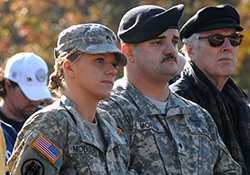Office of Research & Development |
 |
Office of Research & Development |
 |

VA Research Currents archive
March 11, 2014

Army Sgt. Danielle Modglin, left, and Spc. Ricky Morris take part in a Veterans Day ceremony in Washington, D.C., in 2008. The Soldiers, who were wounded in Iraq, were recovering at Walter Reed Army Medical Center. (Photo by Michael J. Carden)
Maintaining the social support of military peers after active duty is associated with better physical health among women Veterans, regardless of whether they have posttraumatic stress disorder, says a study by researchers at the VA Puget Sound Health Care Center. The study appeared in the December 2013 Journal of Traumatic Stress.
The study involved more than 3,600 women veterans from across the country. The women, who included Vietnam-era as well as OIF and OEF Veterans, underwent PTSD screening. Seventy percent reported trauma exposure and among those, 19 percent screened positive for PTSD.
Researchers also asked Veterans the extent to which they maintained the social support of their military friends. That information, in addition to the women's PTSD status, was analyzed against self-reported physical health and the number of times the women had accessed VA care. Screening positive for PTSD was linked to poorer health and more use of health care resources, while greater military social support was associated with better health and less frequent health care utilization. The positive impact of social support was significant regardless of women's PTSD status.
The study was limited in that Veterans may have misreported hospital visits, trauma, or other information. Furthermore, social support is complex, and what holds true for women Veterans might not for male Veterans. For example, one 2013 study found that while military peers protected men from mental health issues, civilian support played a larger role among female Marine recruits.
Despite the limitations, the study offers a glimpse into potential red flags as well as possible treatment options to improve overall health among women Veterans.